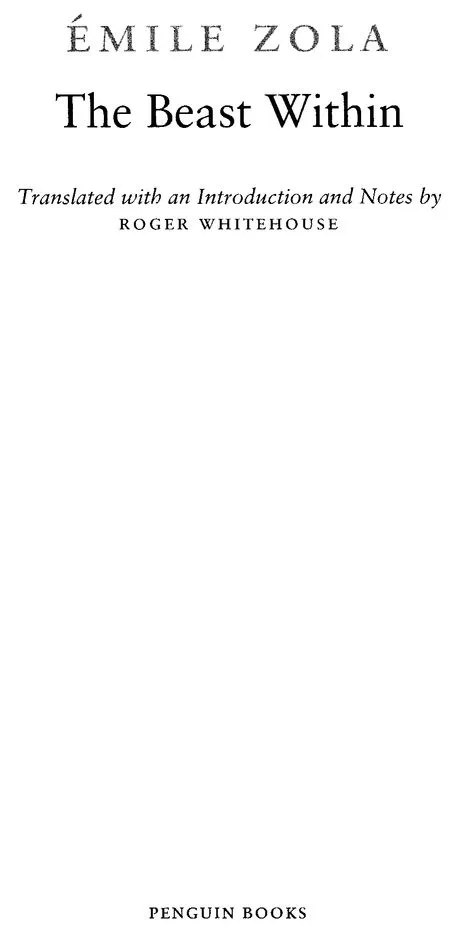The Beast Within

Table of Contents
PENGUIN CLASSICS
Title Page
Copyright Page
Introduction
Acknowledgements
THE BEAST WITHIN
I
II
III
IV
V
VI
VII
VIII
IX
X
XI
XII
Notes
PENGUIN CLASSICS
PENGUIN CLASSICS
THE STORY OF PENGUIN CLASSICS
PENGUIN  CLASSICS
CLASSICS
THE BEAST WITHIN
ÉMILE ZOLA, born in Paris in 1840, was brought up in Aix-en-Provence in an atmosphere of struggling poverty after the death of his father in 1847. He was educated at the College Bourbon at Aix and then at the Lycée Saint-Louis in Paris. After failing the baccalauréat twice and then taking menial clerical employment, he joined the newly founded publishing house Hachette in 1862 and quickly rose to become head of publicity. Having published his first novel in 1865 he left Hachette the following year to become a full-time journalist and writer. Thérèse Raquin appeared in 1867 and caused a scandal, to which he responded with his famous Preface to the novel’s second edition in 1868 in which he laid claim to being a ‘Naturalist’. That same year he began to work on a series of novels intended to trace scientifically the effects of heredity and environment in one family: Les Rougon-Macquart. This great cycle eventually contained twenty novels, which appeared between 1870 and 1893. In 1877 the seventh of these, L’Assommoir (The Drinking Den), a study of alcoholism in working-class Paris, brought him abiding wealth and fame. On completion of the Rougon-Macquart series he began a new cycle of novels, LesTroisVilles: Lourdes,Rome, Paris (1894-8), a violent attack on the Church of Rome, which led to another cycle, Les Quatre Évangiles. While his later writing was less successful, he remained a celebrated figure on account of the Dreyfus case, in which his powerful interventions played an important part in redressing a heinous miscarriage of justice. His marriage in 1870 had remained childless, but his happy, public relationship in later life with Jeanne Rozerot, initially one of his domestic servants, brought him a son and a daughter. He died in mysterious circumstances in 1902, the victim of an accident or murder.
ROGER WHITEHOUSE was educated at King Edward VI Grammar School, Aston, in Birmingham. He studied French at the University of Oxford and later at the University of Warwick, where he specialized in Renaissance Studies. For several years he lived and worked in Paris, teaching at the École Normale Supérieure and at the Sorbonne. In 1970 he joined the staff at Bolton Institute as a lecturer in French and subsequently became Head of Literary Studies there. In 2000 he was appointed as a Research Fellow. He has previously translated Flaubert’s Three Tales (Penguin Classics, 2005) and is currently editing an anthology of the work of the Belgian poet Émile Verhaeren.

PENGUIN CLASSICS
Published by the Penguin Group
Penguin Books Ltd, 80 Strand, London WC2R ORL, England
Penguin Group (USA) Inc., 375 Hudson Street, New York, New York 10014, USA
Penguin Group (Canada), 90 Eglinton Avenue East, Suite 700, Toronto, Ontario, Canada M4P 2Y3 (a division of Pearson Penguin Canada Inc.)
Penguin Ireland, 25 St Stephen’s Green, Dublin 2, Ireland (a division of Penguin Books Ltd)
Penguin Group (Australia), 250 Camberwell Road, Camberwell, Victoria 3124, Australia (a division of Pearson Australia Group Pty Ltd)
Penguin Books India Pvt Ltd, 11 Community Centre, Panchsheel Park, New Delhi - 110 017, India
Penguin Group (NZ), 67 Apollo Drive, Rosedale, North Shore 0632, New Zealand (a division of Pearson New Zealand Ltd)
Penguin Books (South Africa) (Pty) Ltd, 24 Sturdee Avenue, Rosebank, Johannesburg 2196, South Africa
Penguin Books Ltd, Registered Offices: 80 Strand, London WC2R ORL, England
www.penguin.com
First published 1890 This translation first published 2007 1
Translation and editorial matter copyright © Roger Whitehouse, 2007
All rights reserved
The moral right of the translator and editor has been asserted
Set in 10.25/12.25 pt PostScript Adobe Sabon Typeset by Rowland Phototypesetting Ltd, Bury St Edmunds, Suffolk
eISBN : 978-1-101-16061-9
http://us.penguingroup.com
Chronology
1840 (2 April) Émile Zola born in Paris, the only son of an Italian engineer, Francesco Zola (b. 1795) and of Françoise-Emilie Auber (b. 1819).
1843 The family moves to Aix-en-Provence, which becomes the town of ‘Plassans’ in the Rougon-Macquart novels. Plassans is the birthplace of Jacques Lantier.
1847 (27 March) Francesco Zola dies from pneumonia caught while supervising a project to supply Aix-en-Provence with drinking water. The family is left almost destitute.
1848 The July monarchy (King Louis-Philippe) is overthrown, and the Second Republic is declared.
1851 The Republic is dissolved after the coup d‘état of Louis-Napoleon Bonaparte.
1852 (2 December) Louis-Napoleon Bonaparte proclaimed Emperor as Napoleon III. Start of the Second Empire, the period in which the Rougon-Macquart novels are set. Zola is enrolled as a boarder at the College Bourbon in Aix, where he forms a friendship with Paul Cézanne.
1853 (June) Baron Georges-Eugène Haussmann is appointed Prefect of the Seine and begins major rebuilding of central Paris (this is mentioned in La Bête humaine).
1858 (February) Leaves Aix to join his mother in Paris. Attends the Lycée Saint-Louis.
1859 Falls ill with typhoid and twice fails the baccalauréat.
1860 A period of great hardship. Attempts to make a living from writing. (6 December) Victor Poinsot murdered on a train travelling from Troyes to Paris.
1862 (I March) Zola starts working for the publisher Hachette. Initially employed in the dispatch office, he is quickly appointed as head of publicity. (31 October) Becomes a naturalized French citizen.
1863 First newspaper article published.
1864 Publication of his first literary work, Contes à Ninon, a collection of short stories.
1865 Publishes first novel, La Confession de Claude. Meets his future wife, Gabrielle-Alexandrine Meley (b. 1839). They do not marry until 1870.
1866 Resigns his position at Hachette. From this point Zola lives by his writing. Writes articles for L‘Événement, praising the work of Manet and Monet.
1 comment